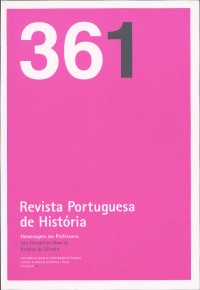Please use this identifier to cite or link to this item:
https://hdl.handle.net/10316.2/46112| DC Field | Value | Language |
|---|---|---|
| dc.contributor.author | Braga, Isabel M. R. Mendes Drumond | - |
| dc.date.accessioned | 2019-03-27T11:29:34Z | |
| dc.date.accessioned | 2020-10-05T05:42:02Z | - |
| dc.date.available | 2019-03-27T11:29:34Z | |
| dc.date.available | 2020-10-05T05:42:02Z | - |
| dc.date.issued | 2003 | - |
| dc.identifier.issn | 0870-4147 | - |
| dc.identifier.uri | https://hdl.handle.net/10316.2/46112 | - |
| dc.description.abstract | Estudar as práticas alimentares do período quinhentista em Portugal remete-nos, de forma directa, para a análise do primeiro livro de receitas conhecido, normalmente designado como Livro de Cozinha da Infanta D. Maria, escrito algures nos finais do séc. XV, início do século XVI. Recentemente fontes diversas têm vindo a ser difundidas, permitindo um melhor conhecimento das técnicas alimentares e, sobretudo, dos consumos dos grupos privilegiados. Bem menos dados temos para a alimentação popular, caracterizada, frequentemente, por carências quer no âmbito dos produtos quer na quantidade dos mesmos, mesmo numa época em que comer bem era sinónimo de comer muito. Na alimentação dos não privilegiados entram os consumos e as preparações culinárias das duas mais importantes minorias existentes em Portugal no século XVI, os cristãos novos de mouros ou mouriscos e os cristãos novos de judeus. Neste subgrupo, quase tudo nos é praticamente desconhecido. A consulta de documentos da Inquisição ajuda, ainda que de forma não cabal, a minorar esta falha, já que não se encontram livros de receitas para estes grupos nem muitas outras fontes que nos permitam ajuizar do modo como se preparavam e se comiam os alimentos. | por |
| dc.description.abstract | The study of eating behaviour, in the 16th century Portugal, leads us naturally to the consideration of the first known recipe book, usually called the “Cookery Book of Infanta D. Maria”. More recently other sources have been revealed which make possible a better understanding of the cooking techniques of the privileged groups. On the other hand, we are far less informed about popular alimentation, frequently marked by a severe shortage both in quality and quantity of food, even in a period when eating well was synonymous with eating much. Among the non-privileged there were the two most important minority groups in Portugal, the Moor or Moorish and the Jew converts (‘New Christians’), of whose cooking and eating habits we know almost nothing. Nevertheless, the Inquisition records help us to fill this gap (to a certain extent), since we didn’t find specific cookery books or other sources from which we could estimate the way they prepared and ate their meals. | eng |
| dc.language.iso | por | - |
| dc.publisher | Imprensa da Universidade de Coimbra | - |
| dc.rights | open access | - |
| dc.title | A alimentação das minorias no Portugal quinhentista | por |
| dc.type | article | - |
| uc.publication.collection | Revista Portuguesa de História nº 36 vol. 1 | - |
| uc.publication.firstPage | 405 | - |
| uc.publication.issue | 36 | - |
| uc.publication.lastPage | 421 | - |
| uc.publication.location | Coimbra | - |
| uc.publication.journalTitle | Revista Portuguesa de História | - |
| uc.publication.volume | 1 | por |
| dc.identifier.doi | 10.14195/0870-4147_36-1_18 | - |
| uc.publication.orderno | 21 | - |
| uc.publication.area | Artes e Humanidades | - |
| uc.publication.manifest | https://dl.uc.pt/json/iiif/10316.2/46112/271256/manifest?manifest=/json/iiif/10316.2/46112/271256/manifest | - |
| uc.publication.thumbnail | https://dl.uc.pt/retrieve/12209323 | - |
| item.grantfulltext | open | - |
| item.fulltext | With Fulltext | - |
| Appears in Collections: | Revista Portuguesa de História | |
Files in This Item:
| File | Description | Size | Format | |
|---|---|---|---|---|
| a_alimentacao_das_minorias_no_portugal_quinhentista.pdf | 251.96 kB | Adobe PDF |  |
Items in DSpace are protected by copyright, with all rights reserved, unless otherwise indicated.
